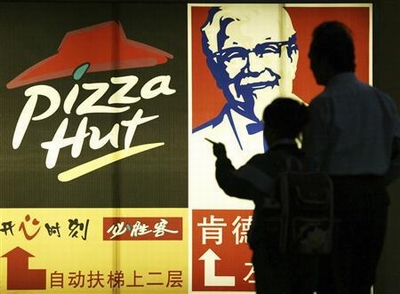
The Chinese sales fall was something of a setback for Louisville, Kentucky-based Yum, which in recent months had seen same-restaurant sales declines ease.
Shares in Yum fell $2.86, or 3.8 percent, to $71.61 in after-hours trading.
Analysts, on average, had expected a 7.1 percent decline in China's July same-restaurant sales, according to Consensus Metrix.
Yum generates more than half of its overall operating profit in China, where it is the biggest Western restaurant operator with roughly 6,000 mostly KFC restaurants.
Yum executives repeatedly have said that the company has successfully dealt with crises in China before.
In a regulatory filing on Monday, they repeated their forecast for same-restaurant sales in the world's fastest-growing major economy to turn around in the fourth quarter.
Yum's China sales swoon started at the end of 2012, when the discovery of excessive levels of antibiotics in chicken from two of Yum's suppliers prompted government food safety agencies to probe the company's supply chain.
Yum was not fined by food safety authorities, but it suffered a widespread backlash in the mainstream media and on social media sites.
The July same-restaurant sales result included a 16 percent sales drop at established KFC restaurants, which the company on Monday attributed to "residual effects" of negative publicity surrounding that December poultry supply incident.
Investment Technology Group analyst Steve West said he expects Yum's China recovery to be uneven and that some investors and analysts got "a little ahead of the curve."
Worries about a new bird flu gripped China this spring, battering chicken sales - including at KFC.
The World Health Organization on July 20 said it had been informed of 134 laboratory-confirmed cases, including 43 deaths, of the novel H7N9 bird flu virus in China. While the number of reported cases has fallen sharply, WHO has cautioned against calling the outbreak over because the flu virus does not circulate as easily in warm weather.
There is concern that China's cooling growth could keep a lid on demand for fried chicken and other fast food.
Once boasting double-digit growth, China is now expanding at a more modest 7.5 percent rate and there are concerns that its credit markets are overheated and its housing market is in bubble territory.
Yum is not the only company struggling with softness in China. McDonald's Corp (MCD.N) last week reported that its China same-restaurant sales declined in July.





